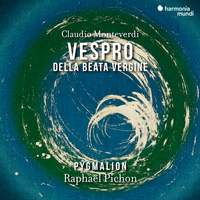Recording of the Week,
Monteverdi's Vespers from Raphaël Pichon and Pygmalion
The opening intonation sets the tone; no church cantor has sung plainsong like that for a century or more, if ever. It's unashamedly operatic, and I’ll admit that initially I bounced off it. But give it fifteen seconds – once the tutti comes in, it all starts to fall into place. There’s a surprisingly heavy pulse from the continuo beneath, coming primarily from a strongly thrummed theorbo, and this helps to enliven Monteverdi’s glorious wall of exultant D major. So too does some very impressive ornamentation – a taste of what’s to come.
Don’t let this blockbuster opening alarm you, though; this is not a uniformly crash-bang-wallop account of the Vespers. Far from it. The contrast between the first movement and the first of the psalm-settings, Dixit Dominus, is enormous. Pichon opens the psalm legato and almost sotto voce, reflecting the simple introductory nature of that first line of text: “The Lord said unto my lord”. Thus, when we get to the bit that actually matters – precisely what it was that the Lord said (“sit thou at my right hand”) – the sound is immediately different again: not forceful, but strong, solemn, ceremonial.
The same is true throughout – for instance, in the gear-shift between the jolly, almost comical, trotting music that opens “Laetatus sum” and the more elevated writing of the psalm’s second verse – and it shows how much thought has gone into every phrase. Pichon isn’t afraid to give each musical “paragraph” its own mood in the service of bringing the music to life.
As the St Matthew Passion has Erbarme dich as its peak of exquisite bittersweetness, so too the Vespers has the opening of “Duo Seraphim”, with that wonderful ascent via a chain of overlapping suspensions. I would nominate this as the most beautiful minute of music in Monteverdi’s entire output, though please feel free to inundate the Presto inbox with other suggestions. Before hearing Pichon’s recording, I’d only encountered the opening duet performed by a pair of very similar voices. This performance was something of a revelation – the distinctly differing timbres of tenors Emiliano Gonzalez Toro (notably brighter and more spun) and Zachary Wilder (tending towards the rich and full-throated) really worked. If this passage of music doesn’t make your spine tingle, nothing will; indeed you might want to check your pulse to confirm you’re still alive.
There are magnificent moments throughout, of course, and nowhere near enough space to mention them all. One of my other favourites, though, is the opening of the last section of the Gloria of the Magnificat (Sicut erat in principio), where again Pichon manages paradoxically to turn the harmonically static, monolithic nature of the music into a positive thing – the initial entries overlapping and reinforcing one another like waves, creating a powerful natural crescendo. The final rallentando is, shall we say, generous – but coming at the end of such a weighty musical journey it feels absolutely earned, right down to the sackbuts’ audible relish in punching out each cadential note as the music comes to rest in a halo of ornamentation (not least from the two – yes, two – harps, who have made their presence felt at various points elsewhere but whose filigree here is the icing on the cake).
And just in case you felt, somehow, short-changed after all that – Pichon rounds proceedings off with a blessing text re-using the music of the opening response. The same heroic cantor (bel cantor?) returns, and Pichon is utterly vindicated; that vocal approach that I initially thought was “a bit much” now feels completely natural, within the stylistic world he’s created. This could very well be the performance of the Vespers to have.
Pygmalion, Raphaël Pichon
Available Formats: MP3, FLAC, Hi-Res FLAC




